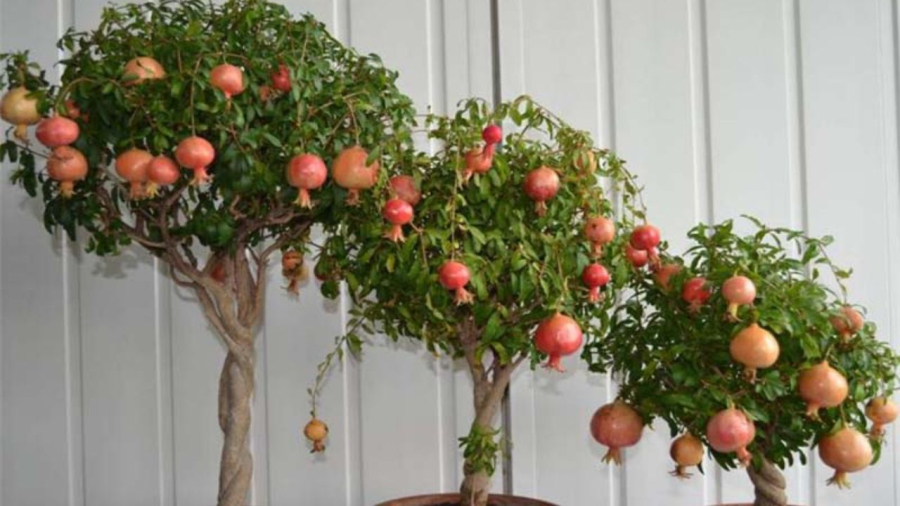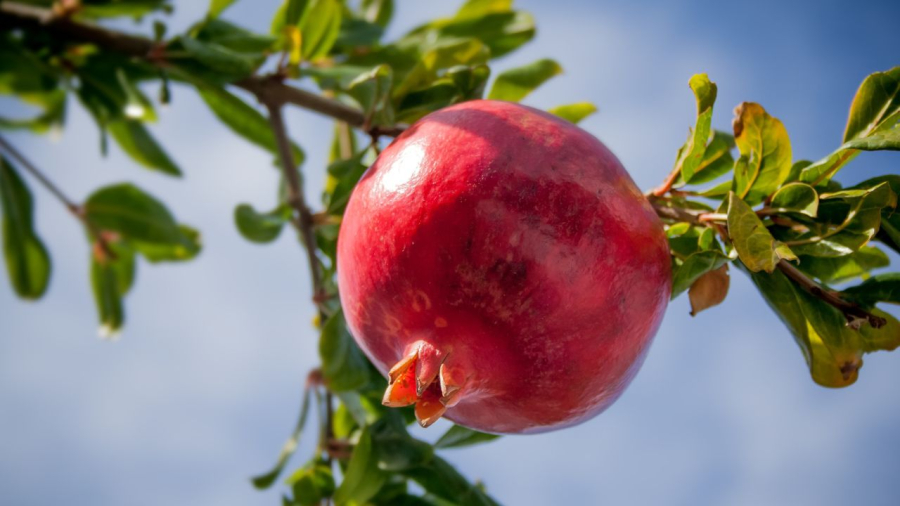What is the Significance of Growing Pomegranate Trees?
In ancient times, people often favored growing pomegranate trees and displaying pomegranate branches indoors as a way to attract good fortune. The pomegranate tree, also known as the stone apple tree, bears fruit and has a pleasing aesthetic. The vibrant red flowers of the pomegranate tree and the deep red, ripe fruit hold symbolic value. According to feng shui, the many seeds within the fruit represent unity and abundance.
The round shape of the pomegranate, resembling a lantern, brings cheer and a sense of festivity, invoking a feeling of good luck and positivity. Thus, in feng shui, the pomegranate tree is believed to be a joyous plant that wards off evil spirits.
Hence, the ancient saying, “Looking at a pomegranate tree in the east brings wealth.” translates to the belief that one should look to the east, where the sun rises, to welcome prosperity into their life.
Pomegranates are also used as wedding decorations, symbolizing a wish for many offspring. On the 15th day of the eighth lunar month, ripe pomegranates hang like small red lanterns, creating a festive and joyous atmosphere.

Pomegranate Trees Bear Delicious Fruit, Have Beautiful Flowers, and Hold Symbolic Significance
Why is it Said that Pomegranates Should be Planted in the East?
The ancient saying, “Planting pomegranates in the east brings wealth,” suggests that pomegranate trees should be planted on the eastern side. Traditionally, houses were built facing south, so planting pomegranates in the east allows them to catch the morning sun. As pomegranate trees thrive in sunlight, planting them in the east ensures they receive ample sunshine for optimal growth. Additionally, the morning light enhances the beauty of the flowers and fruit.
The eastern direction is also associated with attracting wealth and prosperity. Thus, planting pomegranate trees in this direction is believed to invite good luck and abundance, attracting more financial opportunities.
Placing pomegranate trees in front of your house adds a vibrant and lucky touch to your home. In summer, the trees bloom with vibrant flowers, and in autumn, they bear ripe, red fruit, welcoming the season with a festive flair.
Pomegranate trees can be grown in pots, as bonsai, or in outdoor gardens. According to feng shui, placing a pomegranate tree in front of your house signifies a wish for your family’s prosperity, happiness, peace, and abundance.

Pomegranates Resemble Lanterns, Signifying the Start of the Festive Season
How to Grow Pomegranate Trees
Planting Season: The ideal time to plant pomegranate trees is at the beginning of the rainy season or towards the end of autumn. The initial rains will help the trees grow and thrive.
Soil Type: Use soil rich in silt or a mixture of loamy soil and organic fertilizers to ensure the trees absorb the maximum nutrients. If planting in a pot, mix the soil with an appropriate amount of rice husk ash to create an optimal growing medium.
Planting Method: Pomegranate trees can be grown from seeds, but grafting branches is a faster method to achieve a mature tree.
Pot Selection: Pomegranate trees are not particular about their pots and can be grown in both cement and plastic containers. Ensure the pot has drainage holes to prevent waterlogging, and a depth of at least 60cm to provide sufficient nutrients for the tree.
When caring for your pomegranate tree, be mindful that older trees tend to develop sharp thorns. If you have children, consider pruning the thorns and branches as needed. Pomegranate trees make a beautiful addition to any home and are believed to bring good fortune and joy.
This information is for reference and exploration only
The Secret to a Prosperous Home: Unlocking the Four Key Indicators of Wealth
In the realm of feng shui, there are four essential items that can bring good fortune to homeowners. These items are believed to be lucky charms that can attract positive energy and prosperity. By incorporating these elements into your home, you can create a harmonious and fortunate living space. So, what are these four lucky charms, and why are they so important in feng shui?
Prosperity.’>The Four Lucky Plants to Attract Wealth and Prosperity.
Uncover the secrets of four auspicious houseplants, believed to possess the power to attract wealth and prosperity. These green allies are said to bring good fortune and abundance, with tales of their ability to “soak in gold and silver” and bless their owners with thriving businesses and overflowing riches.



































